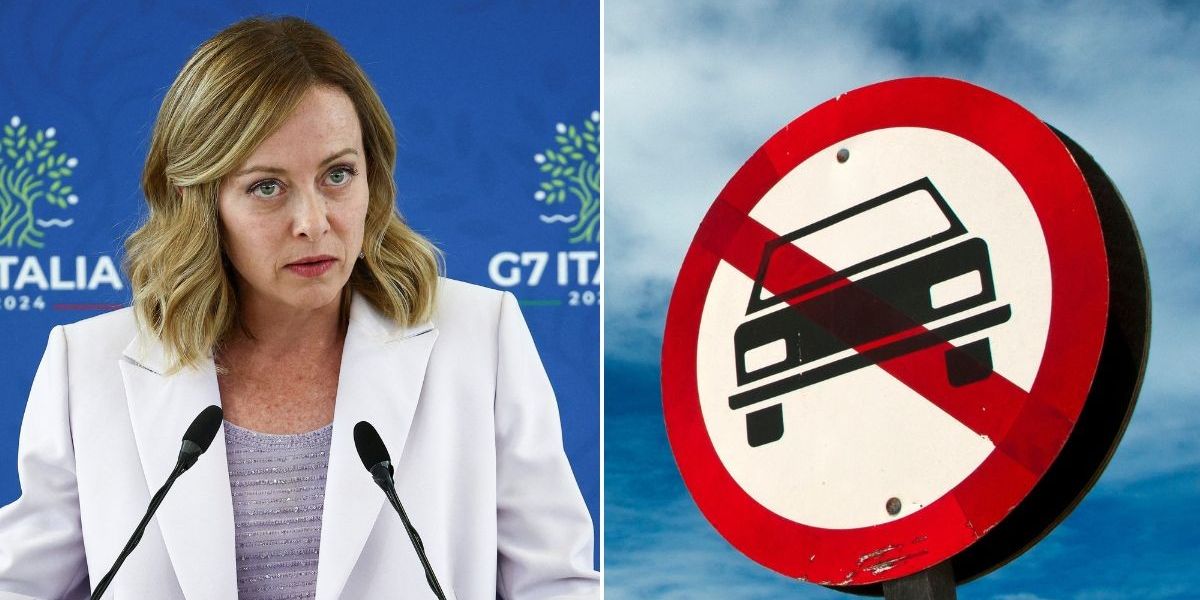Italian Prime Minister Giorgia Meloni has called for the 2035 deadline to ban the sale of new petrol and diesel cars to be changed, saying that it “makes no sense” and that she will work to “correct” it.
Like the UK, the European Union will ban the sale of new vehicles produced with internal combustion engines from the middle of the next decade in a bid to improve environmental practices across the bloc.
The EU also faced opposition when agreeing to the 2035 deadline, with some nation members arguing that other allowances should be made, including the use of more sustainable e-fuels for ICE vehicles.
In a recent speech, Giorgia Meloni, who has been Prime Minister of Italy since October 2022, said that the Italian Government would take steps to “correct” the deadline to make it fairer for drivers before needing to switch.
Do you have a story you’d like to share? Get in touch by emailingmotoring@gbnews.uk
Italy hosted the G7 leaders earlier this month
REUTERS
Speaking to the Italian Parliament ahead of the EU leaders’ summit, Meloni said: “Reducing polluting emissions is the path we want to follow, but with common sense.
“The green perspective has been pursued even at the cost of sacrificing entire production and industrial sectors, such as the automotive industry.
“To argue otherwise was simply an ideological madness that we will work to correct,” Politico reported.
She commented that sticking with the 2035 deadline could “condemn” Europe to “new strategic dependencies”, referencing China’s growing dominance in the electric vehicle sector.
The European Union recently unveiled plans to place huge tariffs on any electric vehicles manufactured in China in a bid to protect the historic European automotive industry.
This includes tariffs for BYD (17.4 per cent), Geely (20 per cent), SAIC (38.1 per cent), other EV brands which cooperated with the investigation (21 per cent) and all other brands which failed to help the EU (38.1 per cent).
Meloni continued, taking aim at net zero measures, saying that reducing pollution should not be done for the sake of economic sustainability, but to promote European production and safeguard jobs.
The leader of the Brothers of Italy (FdI) political party also said that changes had been made in recent years to protect the environment without thinking about the impact it has on humans.
According to Electrive, the Italian Government was forced to close its electric vehicle subsidy scheme after just nine hours when the budget of €200million (£169million) ran out.
Data from the International Energy Agency (IEA) found that there were 2.2 million battery electric vehicle sales across Europe, a rise of 600,000 compared to the previous year.
However, the number of electric vehicles is set to grow massively in the coming years across the continent, with 6.8 million annual sales in 2030 and 13 million by 2035.
The public charging infrastructure has also grown massively in recent years, with IEA figures showing 590,000 slow public chargers and 110,000 rapid and ultra-rapid chargers across the continent.
LATEST DEVELOPMENTS:
Annual sales of new EVs in Europe could reach 13 million in 2035
PA
Projections suggest that there will be 1.06 million public charging devices across Europe, followed by 1.75 million at the end of the decade and 2.74 million in 2035.
